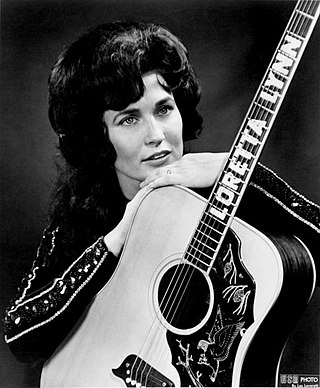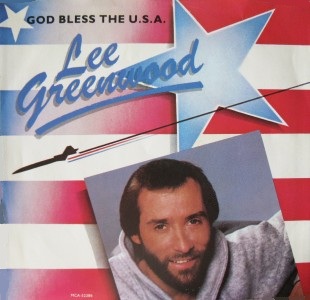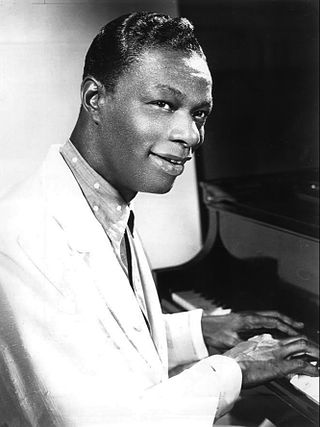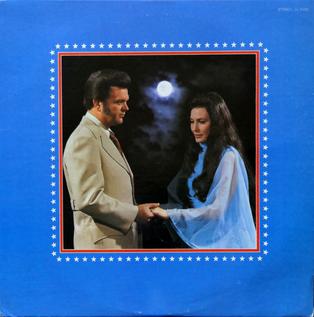
Loretta Lynn was an American country music singer and songwriter. In a career spanning six decades, Lynn released multiple gold albums. She had numerous hits such as "Hey Loretta", "The Pill", "Blue Kentucky Girl", "Love Is the Foundation", "You're Lookin' at Country", "You Ain't Woman Enough", "I'm a Honky Tonk Girl", "Don't Come Home A-Drinkin' ", "One's on the Way", "Fist City", and "Coal Miner's Daughter". The 1980 musical film Coal Miner's Daughter was based on her life.

Harold Lloyd Jenkins, better known by his stage name Conway Twitty, was an American singer and songwriter. Initially a part of the 1950s rockabilly scene, Twitty was best known as a country music performer. From 1971 to 1976, Twitty received a string of Country Music Association awards for duets with Loretta Lynn. He was inducted into both the Country Music and Rockabilly Halls of Fame.

"God Bless the U.S.A." is an American patriotic song written and recorded by American country music artist Lee Greenwood, and is considered to be his signature song. The first album it appears on is his 1984 album You've Got a Good Love Comin'. It reached No. 7 on the Billboard magazine Hot Country Singles chart when originally released on May 21, 1984. That summer, the song was included in a film about President Ronald Reagan, the Republican presidential nominee, that was shown at the 1984 Republican National Convention. "God Bless the U.S.A." gained prominence during the 1988 United States presidential election campaign, when Greenwood performed the song at the 1988 Republican National Convention and at rallies for the Republican nominee, George H.W. Bush. The song was also featured in television advertisements for Bush. The song became popular again during the Gulf War in 1990 and 1991. As a result of its newfound popularity, Greenwood re-recorded the track for his 1992 album American Patriot.

Melvin Lee Greenwood is an American country music singer-songwriter and saxophonist. Active since 1962, he has released more than 20 major-label albums and has charted more than 35 singles on the Billboard country music charts.

Elizabeth Jane Anderson was an American country music singer-songwriter who was one in a wave of new-generation female vocalists in the genre during the 1960s to write and record her own songs on a regular basis. Writing in The New York Times Bill Friskics-Warren noted, "Like her contemporary Loretta Lynn, Ms. Anderson gave voice to female survivors; inhabiting their struggles in a soprano at times alluring, at times sassy."

"The Wayward Wind" is a country song written by Stanley Lebowsky (music) and Herb Newman (lyrics), and first recorded by American singer Gogi Grant in 1955, and released in 1956. Grant's version reached No. 1 on both the Cash Box charts, where it remained at No. 1 for five weeks, and the Billboard charts, remaining at No. 1 for six weeks, ending Elvis Presley's seven-week run at No. 1 with "Heartbreak Hotel". It remained in the top 10 for fifteen weeks, and was ranked as the No. 5 song for 1956 according to Billboard. It became a Gold record. Members of the Western Writers of America chose the song as one of the Top 100 Western songs of all time.
This is a list of notable events in country music that took place in the year 1974.

"The Americans" is a commentary by Canadian broadcaster Gordon Sinclair. Originally written for a regular broadcast on CFRB radio in Toronto on June 5, 1973, it became a media and public phenomenon. It was replayed several times a day by some United States radio stations and released as a hit audio recording in several forms. Ronald Reagan credited it for giving comfort to the United States in difficult times, and it was widely rediscovered and re-disseminated as the United States faced new crises in the 2000s.

"It's Only Make Believe" is a song written by drummer Jack Nance and Mississippi-born singer Conway Twitty, while they were touring across Ontario, Canada in 1958. Twitty was a relatively unknown rock n' roll singer at the time, and this song was his first hit, reaching No. 1 on the Billboard chart in November 1958 for two weeks.
Accompanied recitations of poetry or dramatic texts, most often for spoken voice and piano, became very popular in the nineteenth century as an after dinner entertainment. The genre was often looked down on as something for authors and composers of lesser stature, though there are examples by Robert Schumann and Richard Strauss (Enoch Arden. The English composer Stanley Hawley made many such settings, some of which were performed at the first season of the Henry Wood Proms in London. His friend Lena Ashwell was often the performer.

"Hello Darlin'" is a song written and recorded by American country music artist Conway Twitty. It was released in March 1970 as the first single and title track from the album Hello Darlin. The song was Twitty's fourth No. 1 song on the Billboard magazine Hot Country Singles chart. The song spent four weeks atop the Billboard Hot Country Singles chart that summer, and was named the No. 1 song of 1970. Aside from being Twitty's standard concert opener, the song became a country standard as well as his signature song. When performing with Loretta Lynn, Twitty would frequently sing the song directly to Loretta. Twitty's recording was added to the Grammy Hall of Fame in 1999.

"Mona Lisa" is a popular song written by Ray Evans and Jay Livingston for the Paramount Pictures film Captain Carey, U.S.A. (1949), in which it was performed by Sergio de Karlo and a recurrent accordion motif. The title and lyrics refer to the renaissance portrait Mona Lisa painted by Leonardo da Vinci. The song won the Academy Award for Best Original Song in 1950.
"We Must Have Been Out Of Our Minds" is a song made famous as a duet by country music singers George Jones and Melba Montgomery. Originally released in 1963, the song became a Top 5 hit on the Billboard Hot Country Singles chart and a country music standard.

Lead Me On is the second collaborative studio album by Conway Twitty and Loretta Lynn. It was released on January 17, 1972, by Decca Records.

God Bless America Again is the twentieth solo studio album and third gospel album by American country music singer-songwriter Loretta Lynn. It was released on June 5, 1972, by Decca Records. This was Lynn's last album of religious material for 25 years. Her next gospel album would be 1997's All Time Gospel Favorites.
"Tight Fittin' Jeans" is a song written by Michael Huffman, and recorded by American country music artist Conway Twitty. It was released in June 1981 as the first single from the album Mr. T. The song was Twitty's 26th number one on the country chart. The single stayed at number one for one week and spent a total of 10 weeks on the country chart.

"Don't Sit Under the Apple Tree (with Anyone Else but Me)" is a popular song that was made famous by Glenn Miller and by the Andrews Sisters during World War II. Its lyrics are the words of two young lovers who pledge their fidelity while one of them is away serving in the war.
"The Letter" is a song recorded by American country music artists Conway Twitty and Loretta Lynn as a duet. It was released in June 1976 as the first single from their album United Talent. The song peaked at number 3 on the Billboard Hot Country Singles chart. It also reached number 1 on the RPM Country Tracks chart in Canada. It was written by Twitty and Charles Haney.

Dynamic Duo is the seventh collaborative studio album by Conway Twitty and Loretta Lynn. It was released on June 6, 1977, by MCA Records.

The discography of American country music singer-songwriter Loretta Lynn includes 50 studio albums, 36 compilation albums, two live albums, seven video albums, two box sets and 27 additional album appearances. Briefly recording with the Zero label, she signed an official recording contract with Decca Records in 1961, remaining there for over 20 years The first under the label was her debut studio album Loretta Lynn Sings (1963). It peaked at number two on the Billboard Top Country Albums survey. Lynn would issue several albums a year with her growing success, including a duet album with Ernest Tubb (1965), a gospel album (1965), and a holiday album (1966). Her seventh studio album You Ain't Woman Enough (1966) was her first release to top the country albums chart and to chart within the Billboard 200. Other albums to reach number one during this period were Don't Come Home a Drinkin' (1967) and Fist City. Don't Come A'Drinkin would also become Lynn's first album to certify gold by the Recording Industry Association of America (RIAA).














